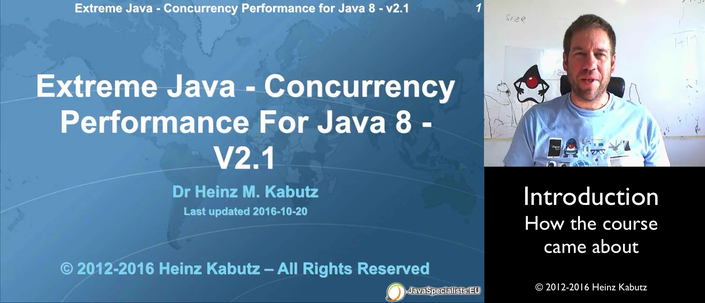
This course could be your most productive learning experience ever! It is aimed at the busy Java professional who wants to quickly learn and apply new essentials on core Java topics. All topics have been thoroughly researched by Dr Heinz Kabutz, famous in over 150 countries for his Java Specialists' Newsletter.
Extreme Java - Concurrency Performance is only concurrency course endorsed by Brian Goetz, author of the best-seller Java Concurrency in Practice. Our course is loosely based on Goetz' excellent book, but adapted for modern Java.
During the course we use the new Java 8 syntax for lambdas and streams, making the code more readable. You will learn about threading, performance, compare-and-swap non-blocking constructs, garbage collectors and many other topics that you will be able to quickly apply in your own work. We will also cover all relevant constructs found in Java 8, such as StampedLock, LongAdder, parallel streams and many more. As a side effect, you will get familiar with Java 8 lambdas and streams.
Please look at the outline to see all the topics covered. During the training, you will always get a chance to try out what you have learned in carefully thought out exercises. This will help you understand and quickly internalize what you have just learned.
Is this course for you?
Students who have successfully completed this course, can expect the following outcomes:
- Throughout the course, we use the new Java 8 syntax. The first outcome would thus be an understanding of how lambdas and streams work in Java 8.
- Students gain a good understanding of why threads are important and what the risks are. They learn how to share objects safely, including visibility concerns. They also master safety techniques of thread confinement, stack confinement and object confinement. Through this, they learn how to design a thread-safe class.
- They will know the difference between a synchronized and a concurrent collection and when to use which one. This is particularly important to be able to write high-performance code that scales well.
- They would understand how a blocking queue can be used to build producer consumer systems and what the various blocking queues are in Java.
- They would know how Semaphore, CountDownLatch and Phaser works.
- Students would learn how to use the thread pool executors to run tasks asynchronously. They would also learn how to configure these, including how to cope with an unexpected number of tasks and how the various settings interact.
- They will learn how to break up a large tasks into smaller tasks by choosing good task boundaries, resulting in tasks that are homogeneous and independent.
- They would learn how to cleanly cancel tasks that have been started by using interruptions and volatile boolean fields.
- Students would learn how the Fork/Join Pool works by comparing it to a normal single-threaded recursive algorithm. They will also get an opportunity to refactor a piece of Fork/Join Code to use parallel streams instead, in order to see how Java 8 can make coding a bit easier.
- Students would know how to detect and solve liveness issues, such as deadlock, livelock and contention.
- They would also know how to find and solve performance bottlenecks, especially in threaded code.
- They would know how ReentrantLock, ReentrantReadWriteLock and the new Java 8 StampedLock work and how we can use that to write efficient code using optimistic techniques.
- They would know how to write their own synchronizers when needed, by creating state-dependent classes.
- Students would understand what atomic classes are and know techniques to use them to build efficient non-blocking classes that offer better performance under contention.
- They would understand the most common garbage collection algorithms: throughput, concurrent and G1 and also how to tune each one to give best performance.
- They would know how to discover performance bottlenecks in an application and also how to solve these. They would also learn how profilers can be used to find bottlenecks and the role of microbenchmarks in confirming these.
- Throughout the course, a strong emphasis is placed on the practical application of learning. Each student needs to complete a set of exercises to demonstrate that they have understood the material.
After successful completion of the course and all the exercises, students qualify for a "course completion certificate" similar to the following:

Java Specialists Certificates
This course is required to obtain the following Java Specialists Certificates:
Your Instructor

Heinz Kabutz is the author of The Java Specialists’ Newsletter, a publication enjoyed by tens of thousands of Java experts in over 150 countries. He has been a Java Champion since 2005.
Course Curriculum
-
PreviewHow the course came about (5:06)
-
PreviewQuestions and exercises (11:17)
-
StartHistory of concurrency (4:08)
-
StartBenefits of threads (9:46)
-
StartRisks of threads (8:19)
-
StartThreads are everywhere (3:58)
-
StartShort Java 7 & 8 primer (23:15)
-
StartExercises (4:54)
-
PreviewExercise Walkthrough: Setting up your IDE (5:27)
-
PreviewExercise Walkthrough: Annotating Persons (4:11)
-
StartStack vs heap memory (9:58)
-
StartSynchronization, Latent defects (5:25)
-
StartAtomicity (9:05)
-
PreviewVisibility (8:37)
-
StartConfinement (7:37)
-
PreviewImmutability (15:54)
-
StartDesigning a thread-safe class (8:48)
-
StartExercises (4:19)
-
StartExercise Walkthrough: Thread confined DateFormat (4:10)
-
StartExercise Walkthrough: Stack confined DateFormat (2:10)
-
StartExercise Walkthrough: Object confined DateFormat (1:31)
-
StartExercise Walkthrough: New DateTimeFormatter (2:46)
-
StartExercise Walkthrough: ByteGenerator (5:32)
